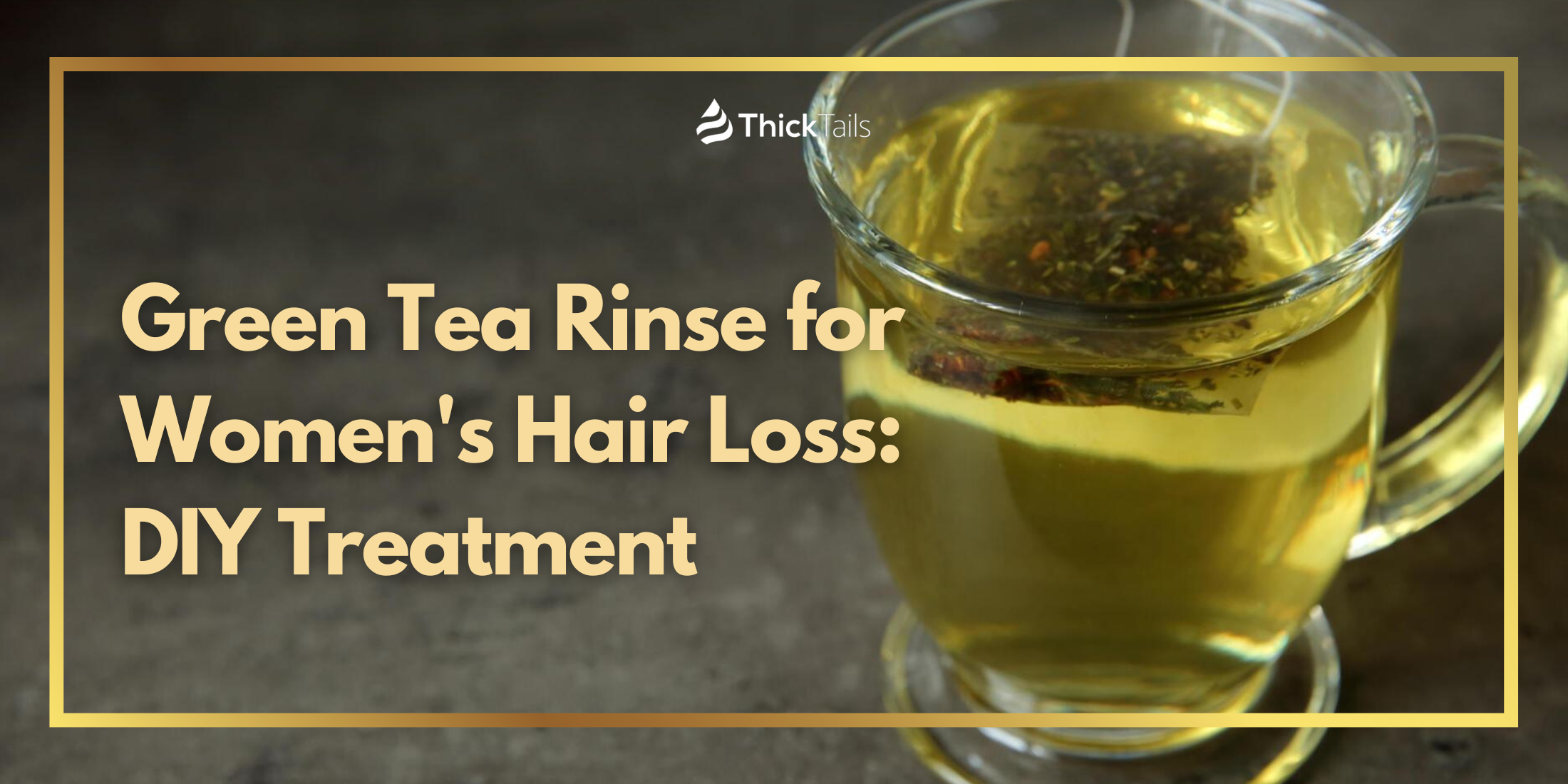Hair loss is often seen as an inevitable part of aging, particularly for women experiencing menopause. But there's a natural elixir sitting in teacups the world over that contains a trove of antioxidants and compounds known to promote hair growth and health. Green tea, with its history of medicinal use and a growing body of scientific evidence supporting its benefits, has made its way into the world of hair care as a potential ally against hair loss in women. This article will explore how green tea can be integrated into a DIY hair care regimen, offering a holistic solution to an often distressing issue.
The Benefits of Green Tea for Women's Hair Loss

Before we get brewing, it's important to understand why green tea is more than just a refreshing beverage—it's a powerhouse for hair health.
Green tea's rich composition of catechins and polyphenols not only aids in preventing hair loss in women but also encourages healthier, stronger hair growth. When integrated into products such as shampoo and conditioner, green tea acts as a natural stimulant, improving the health of the scalp and hair. Additionally, using hair supplements or serums infused with green tea extract can provide a concentrated dose of its beneficial properties, offering a comprehensive approach to combating hair loss.
How Green Tea Promotes Hair Growth and Reduces Hair Loss in Women
Green tea is rich in polyphenols, particularly catechins, which have been shown to have anti-inflammatory, antioxidant, and enzyme-inhibiting properties that can help to stimulate hair follicles. One study in the International Journal of Trichology found that topically applying green tea extract to the scalp led to a significant increase in the number of hair follicles, dermal papilla cells, and hair shaft, indicating its potential as a hair growth promoter.
Antioxidant Properties of Green Tea for Strengthening Hair Follicles in Women
Free radicals can damage the cells responsible for hair growth, leading to weakened follicles and thinner hair. The high concentration of antioxidants in green tea, specifically epigallocatechin gallate (EGCG), helps to combat this damage. By incorporating green tea into your routine, you can fortify your strands against the daily onslaught of environmental stressors.
Other Health Benefits of Green Tea for Women's Hair and Scalp
Green tea doesn't just work on the hair strands themselves; it also aids the scalp. Its antibacterial and antifungal properties make it an effective cleanser, which can be especially beneficial for those dealing with dandruff or an itchy scalp. A healthy scalp is the foundation for healthy hair, and green tea can play a crucial role in maintaining this balance.
DIY Green Tea Rinse Recipe and Application
Now, for the hands-on part. Making your own green tea rinse is simple, and the process is as therapeutic as the end result.
To create your green tea rinse, start by brewing a strong infusion of green tea, allowing it to cool to room temperature. This potent tea can then be used as a final rinse after your regular shampoo and conditioner routine, infusing your hair and scalp with the beneficial antioxidants and compounds. For women battling hair loss, incorporating this green tea rinse along with specialized hair supplements or serums can enhance the overall health and vitality of their hair, making it an essential part of their hair care regimen.
Step-by-Step Guide to Making a Green Tea Rinse for Women's Hair Loss
- Ingredients: You will need about two green tea bags or the equivalent in loose leaf green tea and hot water. Consider adding a teaspoon of raw honey for extra moisturizing benefits.
- Brewing: Steep the green tea in hot water for at least 5 minutes. The longer you steep, the more potent the rinse. Strain the leaves and mix in the raw honey while the tea is still warm to help it dissolve.
- Storage: Once it has cooled, transfer the rinse to a spray bottle for easy application.
How to Apply Green Tea Rinse to Your Hair for Maximum Benefits
- Preparation: Wash your hair with a gentle shampoo and condition, if necessary. Your hair should be damp.
- Application: Section your hair and generously spray the green tea rinse onto your scalp and hair, massaging gently. Ensure all areas are covered.
- Waiting: Leave the rinse in for at least 5 minutes to allow the scalp to absorb the tea’s goodness.
- Rinse: Rinse your hair with cool water to seal the cuticles and lock in the nutrients.
Tips and Tricks for Enhancing the Effectiveness of Green Tea Rinse
- Consistency is Key: Using the rinse consistently over a few weeks can lead to noticeable results. Consider incorporating it into your hair care routine 2 to 3 times a week.
- Customize Your Rinse: You can add other beneficial ingredients to your green tea rinse, such as essential oils like lavender or rosemary, which are also associated with improved hair growth.
- Cold Brew for Convenience: If time is an issue, you can soak the tea bags in cold water overnight for a simpler, albeit less potent, solution.
Incorporating Green Tea Rinse into Your Hair Care Routine

Using the green tea rinse as a one-off treatment might bring temporary benefits, but to see sustained results, it needs to become part of a comprehensive hair care regimen.
Incorporating green tea not just in a rinse, but also looking for hair care products like shampoo, conditioner, hair supplements, and serums that contain green tea extract can significantly amplify the effects against hair loss in women. These products, when consistently used, work synergistically to nourish, protect, and reinforce the hair and scalp, combating hair loss more effectively. This holistic approach, centered around green tea's benefits, presents a natural and promising avenue for women seeking solutions to hair loss.
How Often Should Women Use Green Tea Rinse for Hair Loss
Start by using the rinse 2 to 3 times a week, adjusting the frequency based on how your hair responds. If you notice any dryness, try reducing the frequency or the strength of the rinse. Some women may find daily use beneficial, particularly if they have oily hair or scalp issues such as dandruff.
Precautions and Potential Side Effects of Using Green Tea Rinse
While green tea is generally safe for most people, it's always wise to test any new product or ingredient in a small area to check for allergic reactions. If you have sensitive skin, be cautious about leaving the rinse on for extended periods, as the tannins in green tea can be astringent.
Complementary Hair Care Products to Use with Green Tea Rinse
For a comprehensive approach to hair loss, consider augmenting the green tea rinse with other supportive products. Look for shampoos and conditioners that contain biotin, silica, or keratin, as these ingredients are known to strengthen hair and prevent breakage.
Hair supplements, rich in vitamins and minerals like zinc, iron, and vitamin D, can also provide the hair with the necessary nutrients from the inside out. Combining these supplements with the green tea rinse can be a potent combination against hair loss and in promoting overall hair health.
Finally, a good quality hair serum can help to protect your hair from damage and provide additional nourishment. Choose a serum that is free from harmful chemicals and rich in natural oils such as argan, jojoba, or coconut, which have their own hair-strengthening properties.
In conclusion, green tea's potential in the fight against women's hair loss is a beacon of hope for many who are seeking natural, effective solutions. By preparing and applying a simple green tea rinse, women can harness the power of this ancient remedy to nourish and strengthen their hair. With patience and a holistic approach to hair care, the benefits of green tea for your locks are bound to show, restoring not only your hair but your confidence as well.









